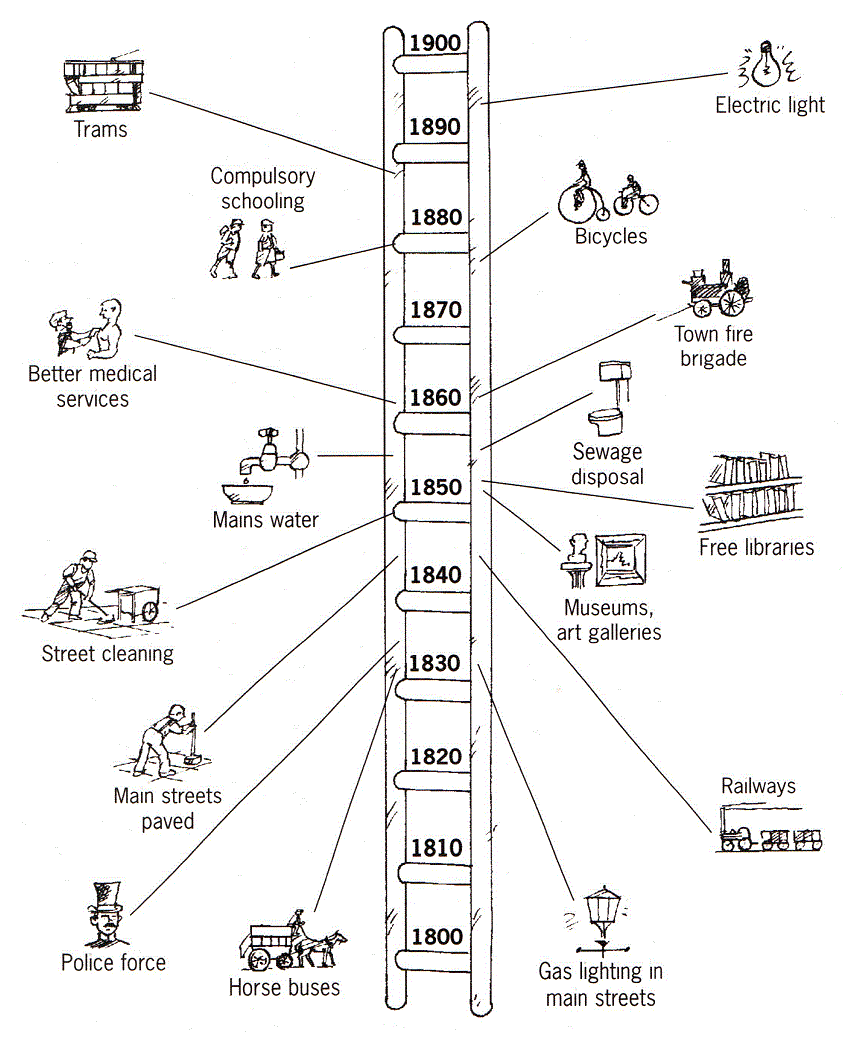
Reform!

Introduction
History books often give the impression that the nineteenth century was an era of cruelty, neglect and terrible suffering. But this is just not true. Many Victorians were caring people. We know about the bad conditions in the towns and factories because caring Victorians investigated them, SO THAT PARLIAMENT COULD CHANGE THINGS.
The Victorians invented the idea of the welfare state, whereby the government has a duty to take care of the people. After 1820, Parliament began to pass laws to make people's lives better.
Better Working Conditions
The Factories Act of 1833 improved conditions for children working in the mills. The Mines Act of 1842 made it illegal to employ women and children in the mines. Most importantly of all, the Victorians introduced inspectors. There had been Factory Acts before 1833, but manufacturers had just ignored them; now government inspectors visited the factories to make sure they did not.
Conditions in the Towns
In 1835, the Municipal Corporatlions Act set up a system of town councils. Public Health Acts (in 1848 and 1875) forced councils to build sewers, provide clean water and clear away slums. But the councils did much more than what the law forced them to do. They competed with each other to pave and clean the streets. They built town halls, libraries and museums. They provided parks, dispensaries (for medicines), swimming baths, street lighting and a fire brigade.
Power to the People
The Victorians discovered the power of public opinion, in this sense; they might be said to have invented real democracy. At the same time, alongside the campaigns to improve working and living conditions, they campaigned to give more men the vote. In 1832, the First Parliamentary Reform Act abolished the rotten boroughs (see this webpage) and gave the vote to a few more people.
Further reforms followed. In the 1840s, the Chartists campaigned for a number of changes which would allow working men to have a greater say in Parliament. Although they were unsuccessful, many of their demands eventually became law. The Parliamentary Reform Acts of 1867 and 1884 extended the vote to ALL men except lords, criminals and lunatics. Even more important was the 1872 Ballot Act, which allowed people to vote in secret.
After 1872, for the first time, British men could elect MPs who would represent them and try to carry out their wishes. In 1893, Keir Hardie, a Scotsman who had been a miner, formed the Independent Labour Party. Women, however, were still not allowed to vote.
Trade Unions
In 1824, the repeal of the Combination Acts allowed trade unions to exist legally. However, it was still illegal to take an oath when you joined the union. In 1834 six farm workers from the village of Tolpuddle in Dorset were transported to Australia for seven years when they swore on the Bible never to reveal the union's secrets. The case of the Tolpuddle Martyrs caused an outcry. In 1837 they were given a free pardon and were allowed to come back home.
The first successful trade unions – called the New Model Unions – were set up in the 1850s. In 1875, the Conspiracy Act allowed union members to picket peacefully during a strike, and during the 1880s the lowest paid workers (for instance, the dockers) began to form strong unions.
Other Reforms
The Prison Act of 1824 improved conditions in the prisons. In 1829, Robert Peel created the Metropolitan (London) Police Force. Also, a number of acts were to make the law less harsh. In 1800 more than 200 offences carried the death penalty (for instance, stealing a handkerchief); by 1841, only murder and treason were punished by hanging. In 1857, transportation was abolished.
Slavery was abolished in the British Empire in 1833.
In 1834, the New Poor Law reorganised the system of poor relief. At first, it was a disaster; the poor hated the workhouses in which they were forced to live if they had no money. By the end of the century, however, the Poor Law had improved.
The Education Act of 1870 provided state-run Board Schools for all children. In 1876, education was made compulsory for all children under the age of 12. After 1891 it was provided free of charge.
The Victorians even cared for animals. The RSPCA was formed in 1824. Public animal fights were banned in 1835, and a number of acts were passed to prevent cruelty to animals. Fifty years later, in 1889, Parliament passed an Act for the Prevention of Cruelty to Children.
In the early years of the twentieth century there were further reforms, which mark the beginning of the Welfare State in Britain – the government introduced pensions in 1909, and unemployment benefit in 1911.
After you have studied this webpage, answer the question sheet by clicking on the 'Time to Work' icon at the top of the page.
1 19th Century Urban Improvements
In this book History Alive 3, the textbook-writer Peter Moss included a timeline, in the form of a ladder, showing typical urban improvements during the 19th Century.
